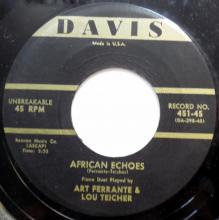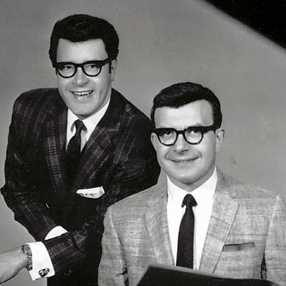Mississippi Boogie/African Echoes
About this album:
Recorded in 1952, these four titles were probably released on two singles. Scott W. Smith's discography lists just the first two titles. I found a 45 single (Davis 451-45, above) which includes Boogie Express (DA-397-45) and African Echoes (DA-398-45).
All four titles were discovered on a reissue Lp by another F&T fan. Kurt L writes:
F&T's first single was used on one of those Guest Star budget LPs. I'm pretty sure that was a Synthetic Plastics, NJ, budget label (Spin-O-Rama, Diplomat, etc.). The first song on each side would have been F&T, with the remainder by a studio artist (in this case it says Philips & Burns with the Metropolitan Strings -- if they actually exist).
Availability:
Singles: Joe Davis Records
Lp: Guest Star Records G 14010


Additional background information can be found in excerpts from The Melody Man: Joe Davis and the New York Music Scene, 1916-1978 (Bruce Bastin with Kip Lornell):
Page 291: In the fall of 1962, he leased the four titles he cut with pop and light classical pianists Ferrante and Teicher – for United States rights only – to Synthetic Plastics Record Corp., which had office on New York's 8th Avenue, close to the old Mastertone studios. The interest in leasing Davis's material, however, didn't seem very brisk.